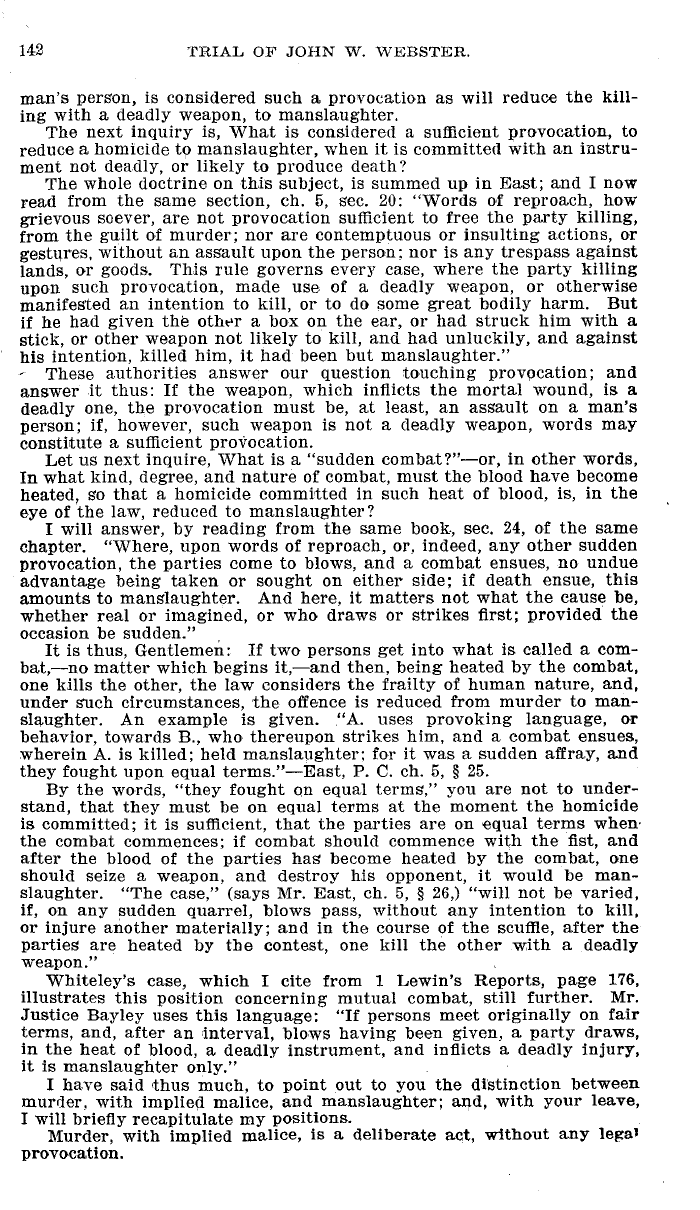|
142 TRIAL OF JOHN W. WEBSTER.
man's person, is considered such a provocation as will reduce the kill-
ing with a deadly weapon, to manslaughter.
The next inquiry is, What is considered a sufficient provocation, to
reduce a homicide to manslaughter, when it is committed with an instru-
ment not deadly, or likely to produce death?
The whole doctrine on this subject, is summed up in East; and I now
read from the same section, ch. 5, sec. 20: "Words of reproach, how
grievous soever, are not provocation sufficient to free the party killing,
from the guilt of murder; nor are contemptuous or insulting actions, or
gestures, without an assault upon the person; nor is any trespass against
lands, or goods. This rule governs every case, where the party killing
upon such provocation, made use of a deadly weapon, or otherwise
manifested an intention to kill, or to do some great bodily harm. But
if he had given the other a box on the ear, or had struck him with a
stick, or other weapon not likely to kill, and had unluckily, and against
his intention, killed him, it had been but manslaughter."
These authorities answer our question touching provocation; and
answer it thus: If the weapon, which inflicts the mortal wound, is a
deadly one, the provocation must be, at least, an assault on a man's
person; if, however, such weapon is not a deadly weapon, words may
constitute a sufficient provocation.
Let us next inquire, What is a "sudden combat?"-or, in other words,
In what kind, degree, and nature of combat, must the blood have become
heated, so that a homicide committed in such heat of blood, is, in the
eye of the law, reduced to manslaughter?
I will answer, by reading from the same book, sec. 24, of the same
chapter. "Where, upon words of reproach, or, indeed, any other sudden
provocation, the parties come to blows, and a combat ensues, no undue
advantage being taken or sought on either side; if death ensue, this
amounts to manslaughter. And here, it matters not what the cause be,
whether real or imagined, or who draws or strikes first; provided the
occasion be sudden."
It is thus, Gentlemen: If two persons get into what is called a com-
bat,-no matter which begins it,-and then, being heated by the combat,
one kills the other, the law considers the frailty of human nature, and,
under such circumstances, the offence is reduced from murder to man-
slaughter. An example is given. "A. uses provoking language, or
behavior, towards B., who thereupon strikes him, and a combat ensues,
wherein A. is killed; held manslaughter; for it was a sudden affray, and
they fought upon equal terms."-East, P. C. ch. 5, § 25.
By the words, "they fought on equal terms," you are not to under-
stand, that they must be on equal terms at the moment the homicide
is committed; it is sufficient, that the parties are on equal terms when
the combat commences; if combat should commence with the fist, and
after the blood of the parties has become heated by the combat, one
should seize a weapon, and destroy his opponent, it would be man-
slaughter. "The case," (says Mr. East, ch. 5, § 26,) "will not be varied,
if, on any sudden quarrel, blows pass, without any intention to kill,
or injure another materially; and in the course of the scuffle, after the
parties are heated by the contest, one kill the other with a deadly
weapon."
Whiteley's case, which I cite from 1 Lewin's Reports, page 176,
illustrates this position concerning mutual combat, still further. Mr.
Justice Bayley uses this language: "If persons meet originally on fair
terms, and, after an interval, blows having been given, a party draws,
in the heat of blood, a deadly instrument, and inflicts a deadly injury,
it is manslaughter only."
I have said ,thus much, to point out to you the distinction between
murder, with implied malice, and manslaughter; and, with your leave,
I will briefly recapitulate my positions.
Murder, with implied malice, is a deliberate act, without any legal
provocation.
|

